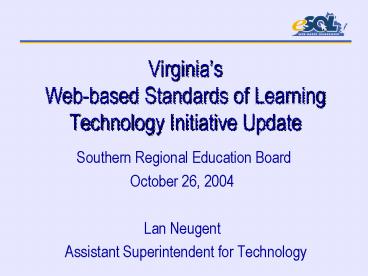Virginias Webbased Standards of Learning Technology Initiative Update - PowerPoint PPT Presentation
1 / 16
Title:
Virginias Webbased Standards of Learning Technology Initiative Update
Description:
Provide a minimum ratio of 1 computer for every 5 high school students ... Chemistry. Earth Science. English: Reading. VA & US History (1995/2001 Versions) ... – PowerPoint PPT presentation
Number of Views:20
Avg rating:3.0/5.0
Title: Virginias Webbased Standards of Learning Technology Initiative Update
1
Virginias Web-based Standards of Learning
Technology Initiative Update
- Southern Regional Education Board
- October 26, 2004
- Lan Neugent
- Assistant Superintendent for Technology
2
A Statewide Initiative Four Goals
- Provide a minimum ratio of 1 computer for every 5
high school students - Create Internet-ready local area network
capability in every high school - Assure high-speed, high-bandwidth capabilities
for instructional, remedial, and testing needs in
every high school - Establish a statewide Standards of Learning test
delivery system
3
Technology Challenges
- User interface workstation hardware
- Connectivity and server requirements
- Security
- Product support, training, documentation
- Scalability
- Reliability and levels of service
4
Architectural Guidelines
Certification Process
Technical Certification Requirement
Stage 1 Self-Certification Checklist (Based on
Architectural Guidelines)
Stage 2 Network Performance Testing
Stage 3 Completion of Pre-Testing Checklist
5
Assessment Challenges
- Interface with existing assessment contractor
- Presentation of tests and ancillary
materials/manipulatives - Data management
- Scoring and reporting
- Test security
- User training and support
- Scalability
6
Assessment Approach
- Phased implementation
- Demonstration phase
- Comparability studies
- Gradual introduction of various End-of-Course
(EOC) tests - Alignment of paper and on-line test
procedures/materials - Voluntary participation by school divisions
7
SOL Technology Initiative Timeline1
Middle School and Elementary School Readiness
Certification begins
All EOC SOL Tests available online (excluding
English Writing)
School Readiness Certification continues at all
levels
Begin Elementary School Online Testing
implementation
Spring 2006
Spring 2009
Spring 2004
Winter 2004
Fall 2003
High School Readiness Certificationcontinues
Full implementation of Middle School Online
Testing
Online EOC SOL Testing implementation continues
Field Tests for Gr 6 7 Mathematics and Reading
available to school divisions online
Full implementation of Elementary School Online
Testing
1Timeline is subject to change.
8
Initiative Funding for Divisions
- Available for capital expenditures in the form of
reimbursements - Concentrated on targeted grade levels (HS, MS or
ES) - Funds raised via VPSA bond sales (annually)
- Series I (Fully expended by divisions - 57.2M)
- Series II (Fully expended by divisions - 58.3M)
- Series III (Complete by Sept 2004 - 58.3M (75
claimed) - Series IV (Complete by Sept 2005 - 58.3M (18
claimed)
9
Current Readiness Certification Status
10
Current Readiness Certification Status
11
Online End-of-Course Tests
12
Online End-of-Course Tests Administered
13
Spring 2004 End-of-Course Tests Available Online
- Algebra I
- Algebra II
- Geometry (Comp Study)
- Biology
- Chemistry
- Earth Science
- English Reading
- VA US History (1995/2001 Versions)
- World History I(1995/2001 Versions)
- World History II (1995/2001 Versions)
- World Geography (1995/2001 Versions)
Audio versions available in Algebra I, Biology,
English Reading, VA US History
14
Spring 2004 Grade 6 7 Field Test
- First opportunity for online testing below the
high school level - 6th Grade Reading and/or Mathematics
- 7th Grade Reading and/or Mathematics
- 16 participating school divisions
- Approximately 11,000 field tests administered
online
15
Fall 2004 Spring 2005 Continued Implementation
- All EOC tests available online (except
EnglishWriting) - All EOC forms to be available as Audio Versions
(except 1995 History tests) - Spring 2005 Reading and Mathematics field test
- Technical assistance to divisions in achieving
Stage II School Readiness Certification - Technical assistance to divisions in
instructional use of technology investment and
use of student data - Series IV Funds continue to be expended
- Series V Funds to become available in May 2005
16
Initiative Success Factors
- Widespread enthusiasm by users
- Ease of access to online vs. paper
- 1/3 to 1/2 of assessment program on-line
- Rapid tests results turnaround (after equating)
- Convenient for student test retakes
- Expanded administrative access to test data
- No security breach of online or server cached
tests - Students believe they do better on-line






























![International Institute of Information Technology - [IIIT-BH], Chhattisgarh PowerPoint PPT Presentation](https://s3.amazonaws.com/images.powershow.com/9659414.th0.jpg?_=20210910064)
![National Institute of Technology - [NITC], Calicut PowerPoint PPT Presentation](https://s3.amazonaws.com/images.powershow.com/9683359.th0.jpg?_=20211114017)